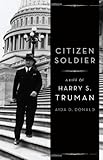

Health and Medical History of President
Harry TrumanLived 1884-1972
Health and Medical History of President
Harry TrumanLived 1884-1972
1776-1783
1812-1815
1846-1848
1861-1865
1898-1899
1917-1918
1941-1945
1950-1953
1964-1975
1990-1991
2001-2021

The issue is interesting because one possible cause of far-sightedness in young people is diphtheria. Diphtheria can paralyze the ciliary muscle, the muscle that allows the eye to focus close in.
Most biographers say Truman wore glasses before he contracted diphtheria. But Truman's son-in-law states that the diphtheria attack left him with the eye problem. 1c
Truman, proficient at math, was "scheduled" to attend the U.S. Military Academy at West Point, but his poor eyesight scuttled the plan and left him bitterly disappointed 2a.
Truman's daughter also recalled that Truman always drove too fast. 1c
In a letter home, Truman wrote that he had learned to sleep with his gas mask on 3 (perhaps 4). Comment: Was Truman gassed during WW1?
Comment: (#1) "Cardiac asthma" is a little-used term today. It is often equated with pulmonary edema (fluid in the lungs), but a 1946 cardiology textbook 6a makes a clear distinction, noting that cardiac asthma can occur without pulmonary edema. Cardiac asthma is asthmatic-type breathing ("asthmatic respiration is a particular type of dyspnea") caused by sudden congestion of the pulmonary circulation. There may or may not be interstitial edema. Both cardiac asthma and pulmonary edema are generally considered to be manifestations of heart failure.
Comment: (#2) Cardiac asthma is usually due to a major mechanical malfunction of the heart and can be rapidly fatal. Unless the cause is something reversible, such as uncontrolled hypertension, a person who is having episodes of cardiac asthma will continue to have them. It apparently did not take much to tip Truman into cardiac asthma in 1947. How did he manage to survive for another 25 years? He was not then hypertensive. One wonders if the diagnosis was correct.
- His grandparents lived into their 90s, and most of his ancestors lived to an advanced age. 1b
- Drank moderately, mostly bourbon and white wine. 1c
- Walked two miles every day 1c. He sometimes walked more. Astronaut Gordon Cooper, who, in his youth, was a Marine assigned to the White House Honor Guard, reports that President Truman would occasionally sneak away from the Secret Service and walk the five miles to the Marine barracks, then walk back 9a.
- When Truman ran for President in 1948 he was 64 years old. He weighed 175 pounds and his blood
pressure was 120-128/80. He had a slow pulse all his life, which his doctors attributed to
a lack of stress.
1e
Comment:
It is hard to believe (a) Truman was without stress, and (b) lack of stress "causes"
a slow pulse. One must also wonder what the standard for "slow pulse" was in the
middle of the 20th century.
By contrast, Mrs. Truman ate a salt-free diet because she had high blood pressure. She would feel "sick" if she got too excited, and would take to bed until her pressure normalized." 2b - On November 1, 1950, two Puerto Rican nationalists attempted to assassinate Truman. They tried to break into Blair House (a building near the White House, where Truman was staying during renovation of the White House). Truman was taking a nap. In three minutes, 32 shots were fired and a White House policeman killed. When later asked about the incident, Truman said: "Well, I'll tell you, getting shot at was nothing I worried about when I was President. It wouldn't have done the slightest bit of good if I had. My opinion has always been that if you are in an office like that, and someone wants to shoot you, they'll probably do it, and nothing much can help you out." 1e
- Bumgarner, John R. The Health of the Presidents: The 41 United States Presidents Through 1993 from a Physician's Point of View. Jefferson, NC: MacFarland & Company, 1994.
 a pp.220, 222 b p.220 c p.221 d pp.221-222 e p.222 f p.223
a pp.220, 222 b p.220 c p.221 d pp.221-222 e p.222 f p.223Comment: Devotes one chapter to each President, through Clinton. Written for the layperson, well-referenced, with areas of speculation clearly identified, Dr. Zebra depends heavily on this book. Dr. Bumgarner survived the Bataan Death March and has written an unforgettable book casting a physician's eye on that experience.
- Parks, Lillian Rogers. My Thirty Years Backstairs at the White House. New York: Fleet Publishing, 1961.
a p.279 b p.304
Comment: This book stayed on the New York Times best-seller list for 26 weeks, prompting Jacqueline Kennedy to require all staff at the White House to sign a pledge agreeing not to write about their experiences (NY Times, page B8, Nov. 12, 1997). Parks's mother, a maid at the White House from 1909-1939, had actually been encouraged by Eleanor Roosevelt to write and publish a memoir (p260).
- Gilwee, William J. ?. Relevance: The Journal of the Great War Society. Vol. 2-4; Spring-Fall 1993.
Comment: Available on the web at: http://www.worldwar1.com/dbc/truman.htm
- Ferrell, Robert H. Dear Bess; The Letters of Harry to Bess Truman, 1910-1959. New York: W.W. Norton, 1983.
- Huget, Jennifer. The secret heart of Harry Truman: Diary reveals diagnosis of "cardiac asthma": hushed up then, obscure still. Washington Post. July 22, 2003; page HE01.
Comment: Accessed through washingtonpost.com: http://www.washingtonpost.com/wp-dyn/articles/A25477-2003Jul21.html There is also a substantially inconsequential correction published the next day: http://www.washingtonpost.com/wp-dyn/articles/A31867-2003Jul22.html
- White, Paul Dudley. Heart Disease. (3rd ed.). New York: Macmillan, 1944; 4th printing May 1946.
a p.29
- Roueché, Berton. Eleven Blue Men and Other Narratives of Medical Detection. New York: Berkley Medallion, 14th printing, 1968 (orig. published 1955).
a p.108
Comment: A wonderful book!
- Elliott, Victoria Stagg. "People were terrified:" Smallpox 1947. American Medical News. June 23, 2003. Pages 34-35.
- Cooper, L. Gordon. Leap of Faith. New York: HarperCollins, 2000.
 a p.102
a p.102











